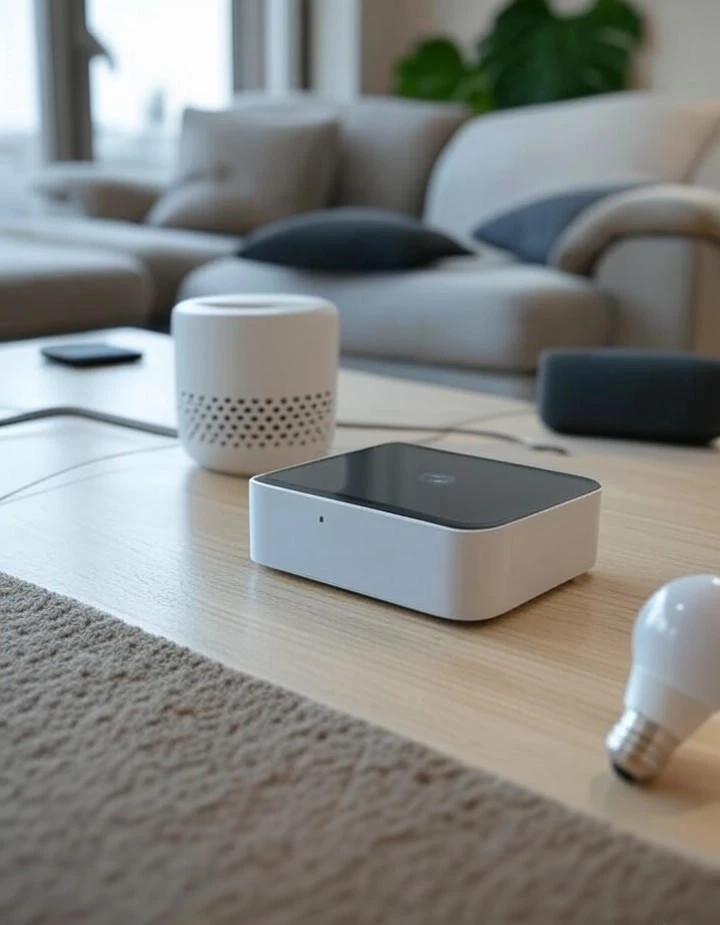
This website uses cookies
We use Cookies to ensure better performance, recognize your repeat visits and preferences, as well as to measure the effectiveness of campaigns and analyze traffic. For these reasons, we may share your site usage data with our analytics partners. Please, view our Cookie Policy to learn more about Cookies. By clicking «Allow all cookies», you consent to the use of ALL Cookies unless you disable them at any time.
If you use a robot vacuum cleaner, intelligent scales, or want to buy a Tesla, you deal with an IoT. This phenomenon is fundamentally changing our lives today. Because of COVID-19, more and more companies have turned their attention to the Internet of Things technologies — people want to control their lives by minimizing social contacts and having all the data on their smartphones.
IoT has already become a part of our lives and will soon become an integral technology for every day. How it works and what to expect in the future — we will discuss right now.
What is the Internet of Things
The Internet of Things or IoT is a network of devices that use an Internet connection to communicate with each other without human interaction with a computer or with another person. For example, IoT devices with sensors do most of the work independently, without a person. But you can manage them using settings, canceling or adding some analytical actions, disabling, and enabling data transfer.
Recently, artificial intelligence (AI) has been added to the technology, which, thanks to training, accelerates and improves the processing of incoming data. Artificial intelligence is rapidly entering our lives and raises many questions.
Anything with a chip and an Internet connection can become part of this ecosystem. It can be an implant in the human body, a water supply system from a city, a car, or a heating system at home. And the number of such devices is growing every year, simplifying our lives and allowing us to have complete control over many phenomena.
IoT also works for the benefit of business — with the help of technology, the service sector improves. For example, there is a total personalization of offers for customers and security systems for goods and employees.
Creation and development of the Internet of Things
It all started in 1999 with a proposal to use radio frequency tags to solve logistics problems at Procter & Gamble. The technology was formed for many years, and with the development of cloud systems, wireless Internet began to work and increase its strength.
Not only did science think about corporations, but in 2004 a study was also published on the usefulness of radio tags for the home. It was a prototype of a "smart home”, such a widespread phenomenon today.
The 2010s brought us the development of the Internet of Things — more and more companies began to implement Internet connectivity in their products, use sensors to track transport, and develop the concept of a "smart home”.
The importance of implementing IoT in our lives
For years, the Internet has provided us with the opportunity to learn new things, to lead a part of life with the help of zeros and ones. Now it helps to control other devices that do not depend on us. Moreover, it is an excellent and helpful solution for business: the cheapness of technologies and their practical application are fascinating.
Automation of processes, for example, in factories, allows you to protect workers from accidents, reduce the risk of unsuitable batches, product delivery becomes cheaper, logistics becomes clearer, controlled, and transparent.
The pandemic has shown us how important it is to monitor health — IoT gives us the ability to check health at home. In addition, it solves the problem of social contacts — you won’t need to go to hospitals for simple tests or even register a visit to the doctor.
The house now becomes a natural fortress, which you can control from the phone. Are you going on vacation and want to make sure that the heating is turned off? Go to the app and check it out. You need to turn on a lullaby to your child, and you are far from the nursery? Remotely turn it on on the speaker and set the volume level. Maybe you want to wake up to your favorite playlist and gradually turn on the lights? Set the desired settings on your phone, and you're done!

Pros and cons of IoT
A lot has already been said about the pros, so let's sum up the advantages:
control of essential business processes (logistics, analytics, machine setup, etc.);
collection of various data (weather, road conditions, engines, changes in the situation of buildings);
saving money for companies — machine-to-machine communication is faster and without human intervention, saving businesses billions of dollars;
save energy and time (electricity, minerals, water, etc.);
simplify management — managers can now focus on strategic decisions while all processes are automated and well-established;
great potential in the healthcare system.
Сons:
high probability of hacker attacks due to imperfect systems;
the more significant the volume of data collected, the more analytical techniques of protection and information collection are needed;
storing information is very expensive;
imperfect communication between devices from different manufacturers;
there was one error in one device — everything will break.
I should note that the disadvantages here are not because the system is terrible, but because of its youth. Now, these are pretty young technologies, which have drawbacks. But all this is being worked out and changed daily. So the more time passes, the fewer cons there are.
Perhaps, while you were reading this, one of them has already disappeared.
The pandemic and the rapid evolution of the IoT
The year 2020 will be written about in history textbooks; this is a fact. The time when you couldn't touch things, hug your loved ones, go for a latte at your favorite cafe. Here comes the finest hour of the Internet of Things.
Voice-controlled interfaces, contactless payment, online banking, delivery - all this has become a part of life, even for those who were afraid to become part of digitalization.
Saving lives has also become the primary vector of technology development. Remote health care, telemedicine are now developing by leaps and bounds, which is good news. Such a sad event allowed the world to look at the new application of IoT.
What is already in development?
monitoring of key health indicators (heart rate, blood pressure, sugar, antibodies, and oxygen levels);
emergency ambulance call with a single click;
complete analysis of health indicators for sports, physical therapy, and postoperative rehabilitation;
reports that are automatically sent to your doctor for examination, prescription of medications, or appointment for a visit.
It sounds like science fiction, but this is our present and future. The Internet of Things should serve for good, and finally, they have reached health care.
More about technologies during the coronavirus.

8 trends in 2021 in the Internet of Things you need to know
The development of such technologies is inevitable, so what can we expect in the future? First, let’s analyze the main IoT trends in 2021.
1. Improving security
People are scared of their wits by password leaks, conversations recorded by Siri in the kitchen, or hacking attacks in government offices. Specialists struggle with this every day. Therefore, now in advertising such technologies, a new system for protecting your data will increasingly sound.
2. Hybrid data storage
All systems in the IoT must work smoothly and without interruptions while maintaining the security of information. Storing all your data on the cloud is already the last century. It is replaced by edge computing, which stores data locally.
Another trend is the restriction of access for a particular group of people or disconnection during danger. To put it simply, Tesla, for example, asks the driver to take the wheel during autopilot mode when the car enters a dangerous turn.
3. Voice control everywhere
Stop touching everything with your hands when you can just give a command to the device. First, it's convenient and safe. Secondly, it is necessary for people with disabilities; the more voice control, the easier it will be for different people to use regular household items.
4. Digital duplication
Another trend is the creation of identical digital models based on physical objects. Thus, the construction of buildings becomes safer; in the operating room, it is possible to prevent problems in the patient, the city administration can effectively plan streets, communications, and new areas.
5. Autopiloting in cars
More and more road accidents are caused by a person every minute, and experts are looking for new ways to drive cars. So naturally, people are wary of the autopilot mode. Still, the technology continues to surprise: optimal routes with minimal fuel consumption, the system's response to dangerous situations, modeling detailed maps of the area with all the existing obstacles on the roads.
6. Personalization of offers
The most significant IoT trend in 2021 is about business and sales; no one is surprised. People want to receive personalized offers and feel that the company has taken care of them. Here we are told hello by artificial intelligence (AI), which offers you products and services based on your data. Such technologies are becoming more intelligent and more sophisticated every day.
7. Blockchain on Guard of Order
IoT devices are often subject to DDoS attacks. The blockchain, in turn, can encrypt data and create communication without intermediaries. Therefore, now this technology is being actively implemented in the communication between devices. In the future, even banks and financial institutions will take full advantage of the Internet of Things.
8. Internet of Things everywhere
Soon we will be observing sensors everywhere: from a teapot to a cosmic rocket. Applications and software for monitoring devices with the Internet of Things are actively developing, so this will become routine over time. In addition, the Internet of Things is ready to integrate with other technologies to make life intelligent and accessible.
The IoT is becoming more and more common. We may not realize it, but such technologies are increasingly penetrating everyday life — the pandemic has only contributed to this.
IoT changes lives
And it's true. We are already used to fitness bracelets, remote control over speakers, and digital duplication. And this is just the beginning: as you can see from the trends, people need IoT and the solutions it offers.
People want to get as much control over their lives as possible, and the Internet of Things allows you to achieve this. Unfortunately, the world has yet to work on the security and trust of people in new solutions. But consumers and companies are willing to try, invest in development and enjoy the benefits that the Internet of Things offers them.
The world is becoming more technological, and more data collection is needed from these technologies. The Internet of Things allows businesses to optimize processes and collect more critical data and metrics. Many companies require the development of the Internet of Things, and Technorely can help with this. Our specialists will sort out what you need and create the necessary applications — and your business will become one step higher.






